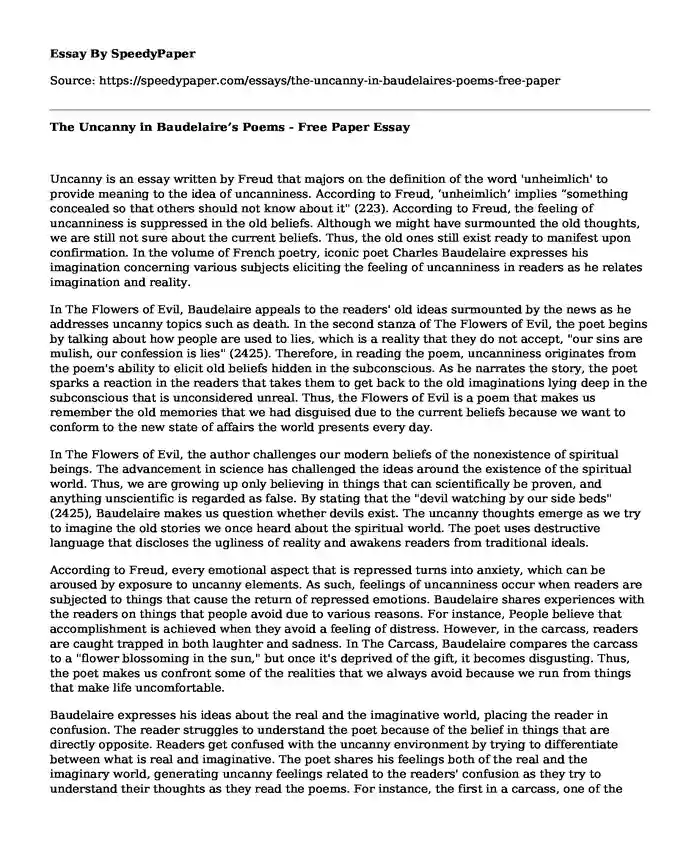
| Type of paper: | Essay |
| Categories: | Psychology Poem |
| Pages: | 4 |
| Wordcount: | 842 words |
Uncanny is an essay written by Freud that majors on the definition of the word 'unheimlich' to provide meaning to the idea of uncanniness. According to Freud, ‘unheimlich’ implies “something concealed so that others should not know about it" (223). According to Freud, the feeling of uncanniness is suppressed in the old beliefs. Although we might have surmounted the old thoughts, we are still not sure about the current beliefs. Thus, the old ones still exist ready to manifest upon confirmation. In the volume of French poetry, iconic poet Charles Baudelaire expresses his imagination concerning various subjects eliciting the feeling of uncanniness in readers as he relates imagination and reality.
In The Flowers of Evil, Baudelaire appeals to the readers' old ideas surmounted by the news as he addresses uncanny topics such as death. In the second stanza of The Flowers of Evil, the poet begins by talking about how people are used to lies, which is a reality that they do not accept, "our sins are mulish, our confession is lies" (2425). Therefore, in reading the poem, uncanniness originates from the poem's ability to elicit old beliefs hidden in the subconscious. As he narrates the story, the poet sparks a reaction in the readers that takes them to get back to the old imaginations lying deep in the subconscious that is unconsidered unreal. Thus, the Flowers of Evil is a poem that makes us remember the old memories that we had disguised due to the current beliefs because we want to conform to the new state of affairs the world presents every day.
In The Flowers of Evil, the author challenges our modern beliefs of the nonexistence of spiritual beings. The advancement in science has challenged the ideas around the existence of the spiritual world. Thus, we are growing up only believing in things that can scientifically be proven, and anything unscientific is regarded as false. By stating that the "devil watching by our side beds" (2425), Baudelaire makes us question whether devils exist. The uncanny thoughts emerge as we try to imagine the old stories we once heard about the spiritual world. The poet uses destructive language that discloses the ugliness of reality and awakens readers from traditional ideals.
According to Freud, every emotional aspect that is repressed turns into anxiety, which can be aroused by exposure to uncanny elements. As such, feelings of uncanniness occur when readers are subjected to things that cause the return of repressed emotions. Baudelaire shares experiences with the readers on things that people avoid due to various reasons. For instance, People believe that accomplishment is achieved when they avoid a feeling of distress. However, in the carcass, readers are caught trapped in both laughter and sadness. In The Carcass, Baudelaire compares the carcass to a "flower blossoming in the sun," but once it's deprived of the gift, it becomes disgusting. Thus, the poet makes us confront some of the realities that we always avoid because we run from things that make life uncomfortable.
Baudelaire expresses his ideas about the real and the imaginative world, placing the reader in confusion. The reader struggles to understand the poet because of the belief in things that are directly opposite. Readers get confused with the uncanny environment by trying to differentiate between what is real and imaginative. The poet shares his feelings both of the real and the imaginary world, generating uncanny feelings related to the readers' confusion as they try to understand their thoughts as they read the poems. For instance, the first in a carcass, one of the poems in the volumes begins with the stanza "remember my love, the object we saw, that beautiful morning in June" (2428), but he continues "by a blend in the path a carcass reclined" (2428). As such, in the first stanza, the poet creates a romantic atmosphere, but as he continues, he talks about death, creating a sharp contrast that leaves the reader confused.
Conclusion
In conclusion, Freud's definition of 'unheimlich' relates to Baudelaire's description of the imaginary and the real world eliciting uncanny feelings in the readers. The poems in the volume are mainly about the poet illustrating the relation between the real and the spiritual world. The poet revives old ideas that make readers confront issues that were buried deep in the subconscious. The poet creates confusion among readers in his description of the real and the imaginary world. For instance, he uncannily contrasts between death and love making the reader confused about where the poet stands between two contradicting subjects. Moreover, uncanny feelings arise when individuals are subjected to things that raise repressed emotions. Most people will always want to be happy, but deep inside they have feelings of sadness that depend on what they confront. As such, they will always avoid things that they can make them sad.
Works Cited
Baudelaire, Charles. The Flowers of Evil. 1963. 3rd ed., New Directions, 1963, pp. 2425-2428.
Freud, Sigmund, James Strachey, Anna Freud, and Angela Richards. The Standard Edition of the Complete Psychological Works of Sigmund Freud. London: Hogarth Press, 1966, pp. 223-241
Cite this page
The Uncanny in Baudelaire's Poems - Free Paper. (2023, Dec 20). Retrieved from https://speedypaper.com/essays/the-uncanny-in-baudelaires-poems-free-paper
Request Removal
If you are the original author of this essay and no longer wish to have it published on the SpeedyPaper website, please click below to request its removal:
- Essay Example Dedicated to the Psychology of Physical Attraction
- The Pressures Young People Have to Go Through Today
- Free Essay Example on Conformity and Social Influence
- Free Essay: Relationship Analysis Paper
- Essay Sample on Child Hardship
- Essay Sample on Applied Research Methods in Psychology- Annotated Bibliography
- Paper Example on Mega Event Planning: Book Review
Popular categories




